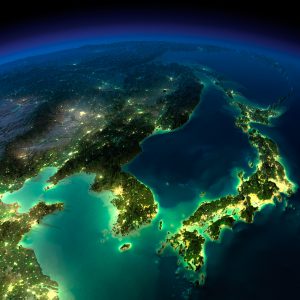It has been over 20 years since Japan and South Korea promised to build a “future-oriented relationship” based on cooperation and historical reconciliation. This ambition has yet to be fully realized, as unresolved historical grievances continue to destabilize bilateral relations, intensifying through South Korea’s court rulings on wartime-era comfort women and forced labor. However, in a recent turn of events, a separate comfort women case has been dismissed based on the principle of sovereign immunity, much to Tokyo’s benefit. Additionally, South Korean President Moon Jae-in has indicated a renewed interest in historical engagement with Japan. These sudden developments present a strategic opportunity for Japan to foster cooperation with South Korea.
In his New Year’s press conference, Moon expressed concern over the court rulings, specifically stating that the comfort women ruling obstructed Seoul’s efforts toward diplomatic resolution with Tokyo. During his March 1 commemoration speech, he announced that South Korea is ready for historical rapprochement with Japan, walking back his previous opposition to the 2015 Comfort Women Agreement as a mechanism for resolution. In response to these developments, Tokyo stated that it is up to Seoul to produce “concrete proposals” to settle their disputes. Even after the rejection of the recent comfort women case, the Japanese government’s stance remains the same. Rather than writing off these events, it is crucial that Japan seizes this as an avenue for cooperation, in order to progress their relationship.
Japan’s retaliatory diplomatic restraint toward South Korea, which prevents both nations from communicating on important areas, presents an obstacle. Japanese Foreign Minister Motegi Toshimitsu has avoided meeting with South Korea’s ambassador to Japan, Kang Chang-il. It was revealed that Japanese Prime Minister Suga Yoshihide would not visit South Korea, due to anger over Japanese assets seized from the forced labor ruling. Given Moon’s unfavorable opinions of the court rulings, diplomatic outreach will be key for discussing proposals on how to best achieve shared outcomes, especially following the dismissal of the separate comfort women case, which has the potential to influence a similar outcome for the January ruling. Furthermore, Moon stated that the South Korean government will work with Japan on a solution the plaintiffs can agree on, which also necessitates more robust diplomatic channels. For instance, both nations could convene a track 1.5 dialogue between their respective foreign affairs officials and the plaintiffs, together with their families, to reach a solution.
Diplomatic tension has also arisen over Japan’s recent decision to release contaminated water from its damaged Fukushima nuclear plant into the Pacific Ocean. Japan is facing both domestic and international criticism over this decision, notably from South Korea. Yet if Tokyo can meet Seoul’s desire for transparency and IAEA compliance, this tension could also be mitigated and transformed into an opportunity for dialogue.
Japan can seek greater security relations with South Korea by enhancing bilateral security and defense cooperation, including trilaterally with the United States. Both countries’ defense ministers regularly meet through the Japan-ROK Defense Ministerial Meeting, but did not meet in 2020. Their last meeting in 2019 included discussion on their worsening security relations from the GSOMIA feud and the ROK Navy fire-control radar incident. Since then, pressing security challenges involving North Korea have continued. Shortly after North Korea’s restart of its ballistic missile testing, the U.S., Japan, and South Korea’s national security advisors reaffirmed their commitment to North Korean denuclearization and peace on the Korean Peninsula.
To follow through, Japan can arrange with South Korea the resumption of their Defense Ministerial Meeting later this year and cooperate on means of deterrence through joint military exercises with the United States. A trilateral Defense Ministerial Meeting to discuss the capacity for trilateral exercises, which are harder to sustain than Japan-U.S. and South Korea-U.S. exercises, would also be beneficial. Although the fate of trilateral exercises will depend on the assurances and concessions from President Joe Biden’s North Korea policy review, the importance of trilateralism will nonetheless be heavily considered in its formulation.
Lastly, both Japan and South Korea share many non-traditional security priorities for potential cooperation. For instance, many South Koreans consider low birthrates, climate change, and COVID-19 as some of the nation’s most critical issues, all of which have a profound impact on Japan. In order to address Japan’s low birthrates, the Suga administration has recently proposed the creation of a children’s agency to coordinate policies on child health and education. Perhaps Japan could share the policy results of this agency with South Korea, as well as exchange research on the topic of low birthrates.
Like Japan, South Korea also set a goal for carbon neutrality by 2050; Tokyo can work with Seoul to reduce their reliance on coal through the development of renewable energies and clean energy technologies. Given the surges of COVID-19 cases in Japan and South Korea, both can boost their future pandemic preparedness through joint early detection measures and export agreements on essential prevention materials, such as masks.
Moving toward a future-oriented relationship will require equal motivation from both Japan and South Korea. While bilateral relations are at a low point, there does exist some room for Japan to cooperate with South Korea, and vice versa, to achieve this long-awaited goal. It is ultimately up to Seoul to resolve the court rulings, but as recent developments in Seoul have shifted in Tokyo’s favor, the Suga administration has a greater chance to respond openly for cooperation.

































